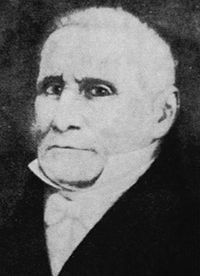Feliciano Chiclana
| Feliciano Chiclana | |
|---|---|

Portrait of Feliciano Chiclana
|
|
| Member of the First Triumvirate | |
|
In office September 23, 1811 – October 8, 1812 Serving with Manuel de Sarratea, Juan José Paso, Juan Martín de Pueyrredón |
|
| Personal details | |
| Born |
June 9, 1761 Buenos Aires |
| Died | September 17, 1826 (aged 65) Buenos Aires |
| Resting place | La Recoleta cemetery |
| Nationality | Argentine |
| Political party | Patriot |
| Other political affiliations |
Saavedrism |
| Military service | |
| Allegiance | Viceroyalty of the Río de la Plata, United Provinces of the Río de la Plata |
| Years of service | 1806-1822 |
| Rank | Colonel |
| Battles/wars | British invasions of the Río de la Plata, Argentine War of Independence |
Feliciano Antonio Chiclana (June 9, 1761 in Buenos Aires – September 17, 1826 in Buenos Aires) was an Argentine lawyer, soldier, and judge.
Feliciano Chiclana studied at the Colegio de San Carlos. In 1783 he finished a law degree at the Universidad de Chile. He returned to Buenos Aires in 1791 and became the secretary to the mayor of Buenos Aires Cabildo. During the British invasions of the Río de la Plata in 1806 he fought as captain of the 1st Patricians' Infantry Regiment. After the reconquest of the city he joined the party of General Cornelio Saavedra.
In 1810, he helped in the planning for the May Revolution as legal counsel to the Cabildo. He was part of the group of moderates which wanted the Cabildo to assume command of the government during the Napoleonic invasion of Spain, only to return it later to the Spanish Crown. He therefore voted on May 22, 1810 to depose the viceroy.
The Primera Junta named him comptroller of the Auxiliary Army of Upper Peru with the rank of Colonel. In August 1810 he was named governor of Salta Province, which is now present-day Jujuy Province. In November 1810 he received orders from Buenos Aires to leave his current post and assume a new post as the new governor of Potosí.
He then returned to Buenos Aires, and became a part of the First Triumvirate, along with Juan José Paso and Manuel de Sarratea in 1811. He was a triumvir until October 8, 1812, untile he was deposed.
...
Wikipedia
